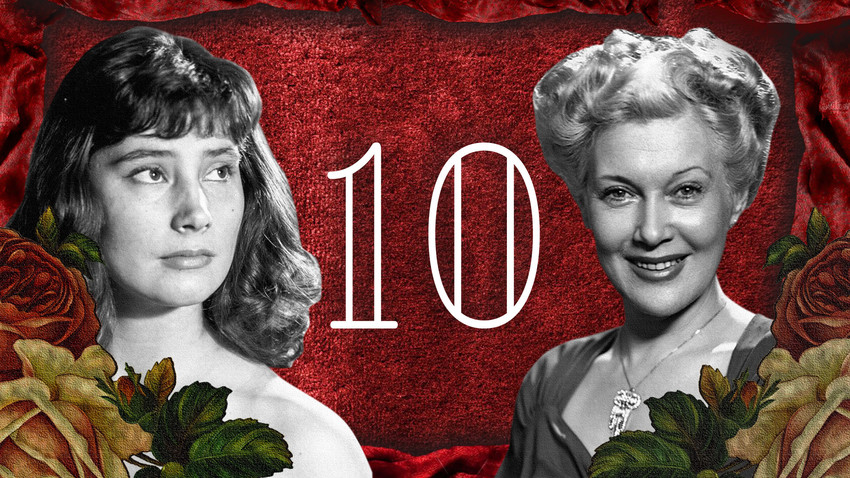
1. Lyubov Orlova (1902-1975)
Soviet cinema queen Lyubov Orlova is widely recognized as one of the most beautiful women in the film industry. The blonde bombshell was descended from an aristocratic Russian family on her mother’s side.
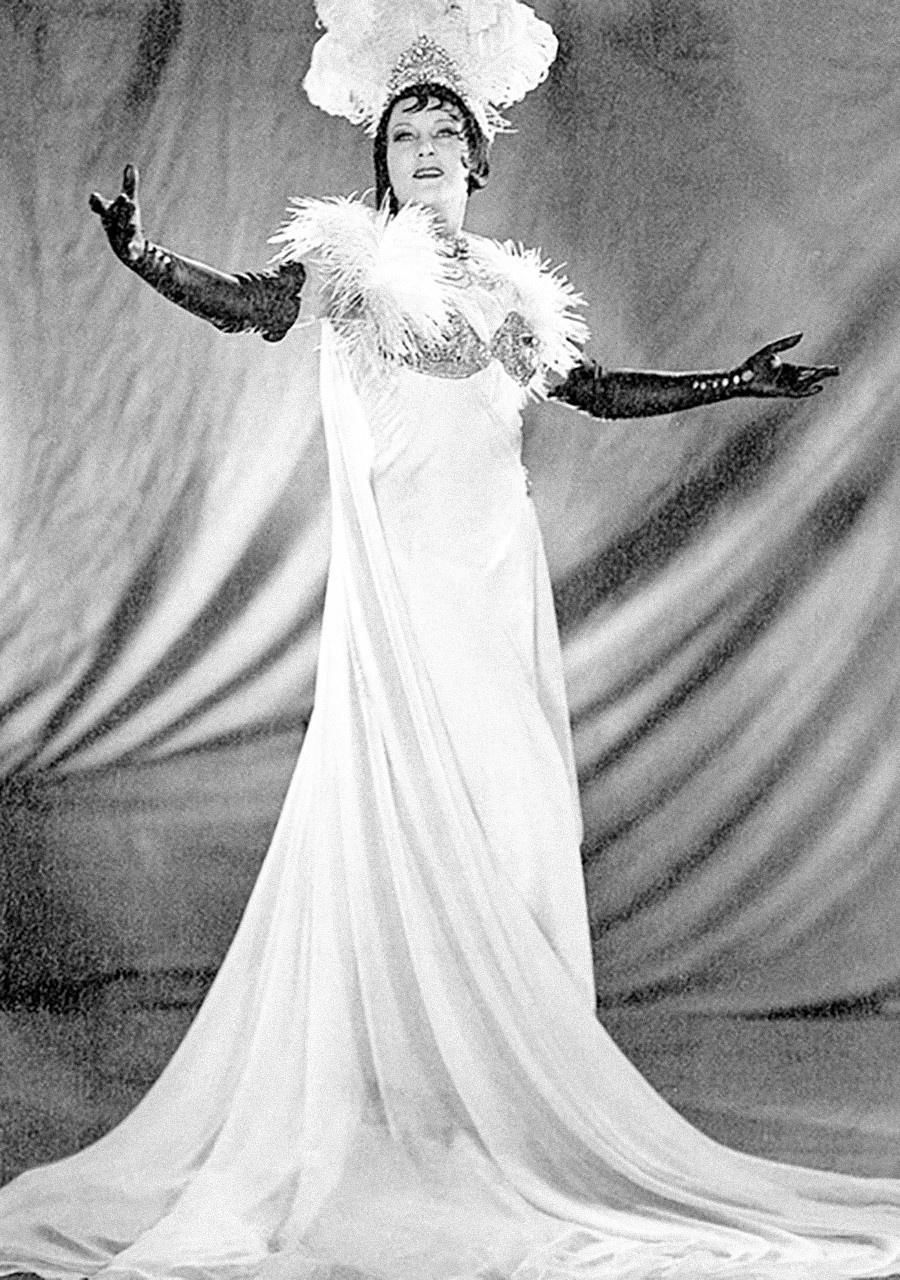
The star of 'The Circus', Lyubov Orlova.
Grigori Aleksandrov/Mosfilm, 1936Lyubov was a good girl. She studied music at the Moscow Conservatory, showed considerable talent and soon became a member of the Musical Theater led by none other than Vladimir Nemirovich-Danchenko. Her parents, meanwhile, wanted their daughter to become a professional pianist. But it was only a matter of time before Orlova addressed her biggest passion, cinema.
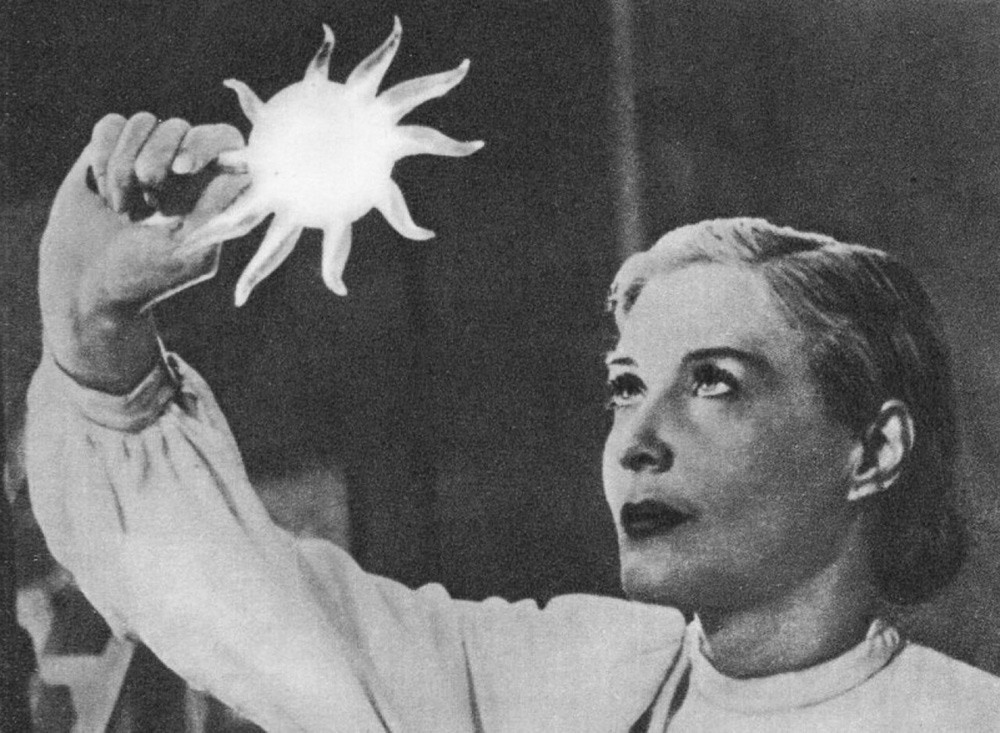
Lyubov Orlova starring in 'Springtime'.
Grigori Aleksandrov/Mosfilm, 1947Lyubov ascended to stardom in 1936 as Marion Dixon, an American circus performer who gives birth to a mixed-race baby in ‘The Circus’, directed by Sergey Eisenstein’s best student and Orlova’s second husband, Grigory Aleksandrov. Orlova lent her talent to brilliant roles in Soviet film classics, such as ‘Jolly Fellows’, ‘Volga-Volga’, ‘Shining Path’, ‘Springtime’ and ‘Meeting on the Elbe’, all directed by Aleksandrov.
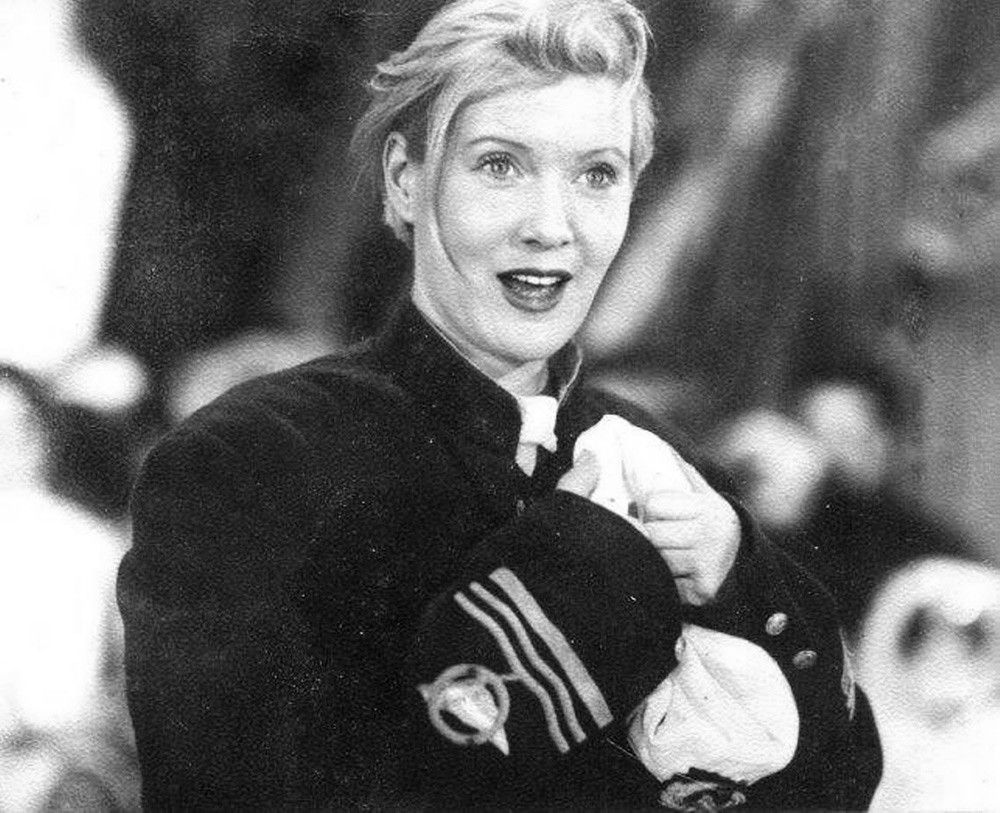
Lyubov Orlova in 'Volga-Volga'.
Grigori Aleksandrov/Mosfilm, 1938For good or bad, Joseph Stalin was deeply fond of the actress and particularly liked Orlova’s portrayal of Dunya Petrova in one of the first Soviet musical comedies, ‘Volga-Volga’. After her death, Orlova’s cinematic legacy did not just disappear beyond the horizon. In 1976, a Soviet astronomer discovered a new planet she called ‘3108 Lyubov’, in homage to Orlova.
Faina never took herself too seriously, although she acted in plays by Chekhov and Tolstoy. She was born Faina Feldman into a prosperous Jewish family in the city of Taganrog. Faina’s memorable stage name, Ranevskaya, was inspired by her love of Chekhov’s play, ‘The Cherry Orchard’.
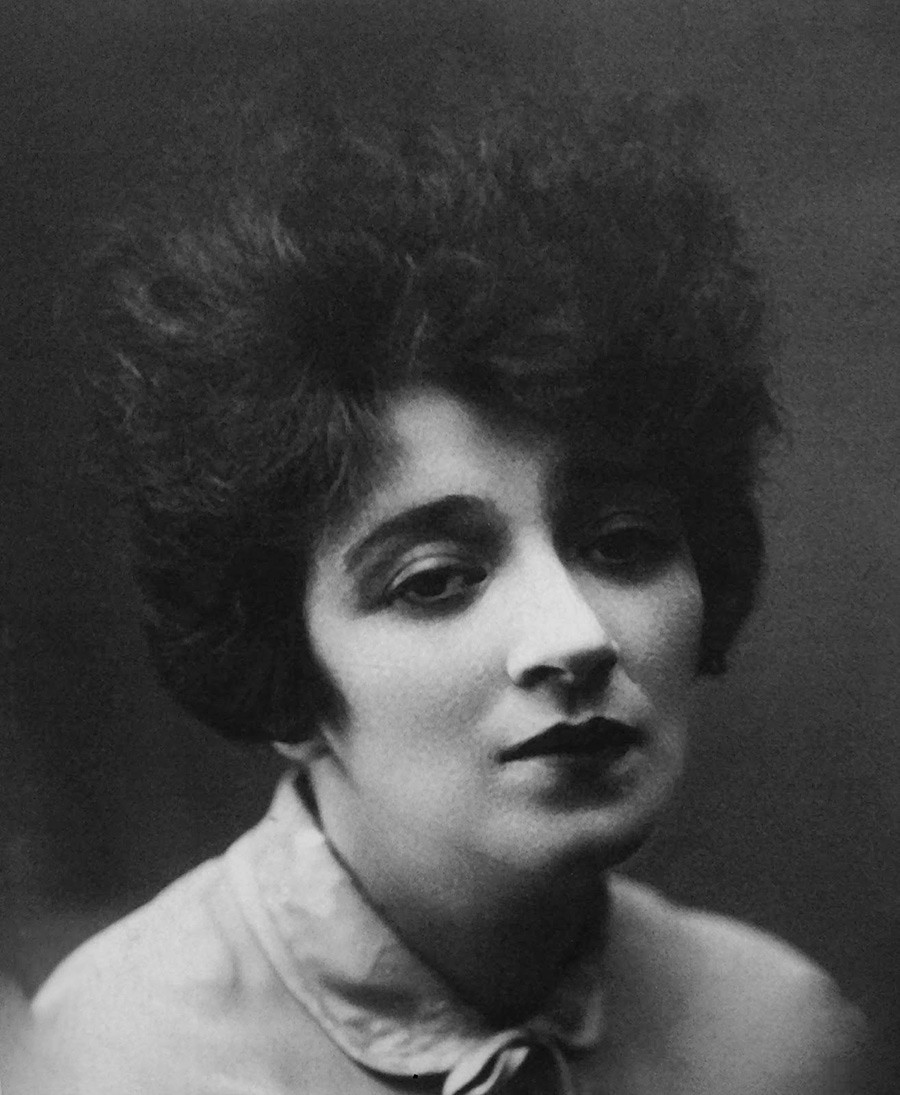
Faina Ranevskaya acted in plays by Chekhov and Tolstoy.
Archive photoHer name became a byword for wit and wisdom. Ranevskay’s catchphrase from the 1939 comedy ‘The Foundling’ -- “Honey, don’t make me nervous!” -- became a common household phrase in the USSR. Ranevskaya was volcanically funny and her quotes were legendary.
“All my life, I’ve swam in the toilet butterfly style…”
“Optimism is the lack of information.”
“Lesbians, homosexuals, masochism, sadism are not perversions. In fact, there are only two perversions: hockey on grass, and ballet on ice.”
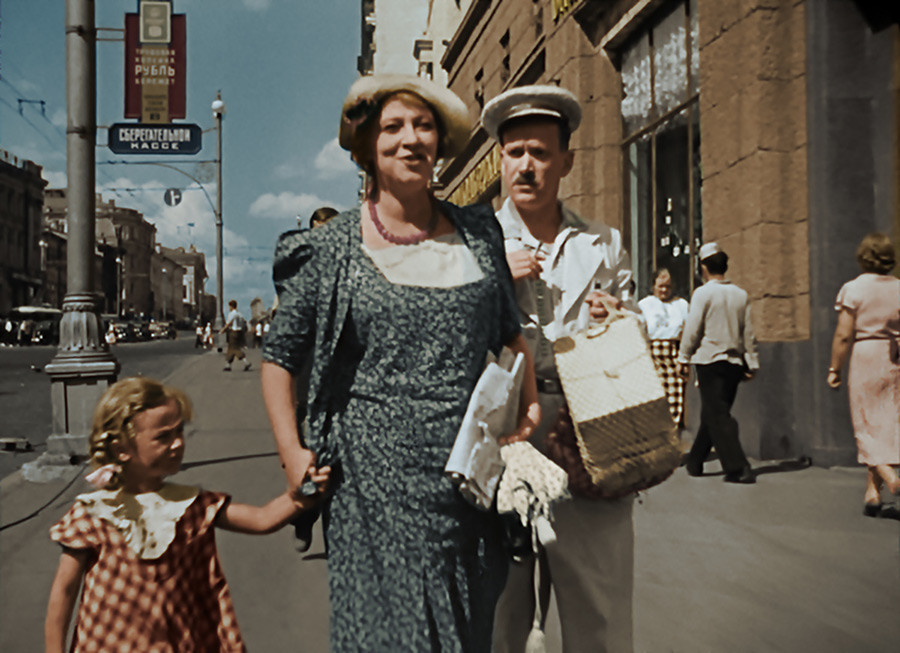
“Honey, don’t make me nervous!” Faina Ranevskaya in 'The Foundling'.
SputnikThe actress adored theater and poetry and was friends with Marina Tsvetaeva, Osip Mandelstam and Vladimir Mayakovsky. According to Anna Akhmatova, Ranevskaya was a kid that is “now 11, and will never turn 12”.
READ MORE: The true story behind this iconic Hollywood star's Soviet bow
Diverse roles contributed to her reputation as a great character actress. Comedic film devotees remember her as Madame Loiseau in ‘Boule de Suif’, ‘The Wedding’, ‘Man in a Shell’, ‘Springtime’, and ‘Cinderella’. Her portrayal of Rosa Skorokhod in Mikhail Romm’s drama ‘The Dream’ (1943) catapulted Ranevskaya to fame. The movie was an international success, reaching audiences on the other side of the Atlantic.
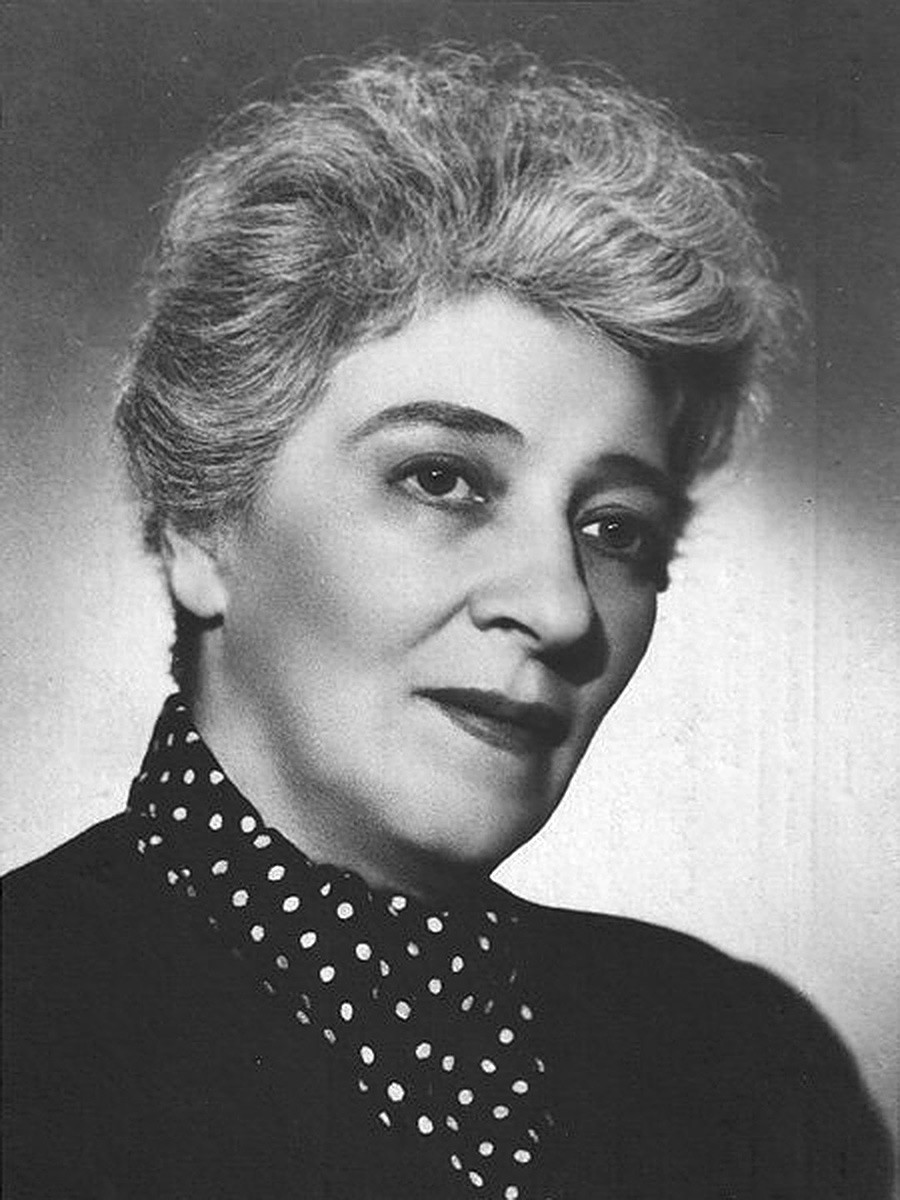
Faina Ranevskaya adored theater and poetry, and was friends with Anna Akhmatova and Vladimir Mayakovsky.
Archive photoThe drama with Ranevskaya in the limelight literally brought back to life the man behind ‘An American Tragedy’, Theodore Dreiser. According to his wife, the novelist had been suffering severe writer’s block, but managed to overcome it after watching ‘The Dream’. Another fan of Ranevskaya was 32nd president of the United States Franklin D. Roosevelt, who described the Soviet star as a tremendously gifted dramatic actress.
Tatiana’s name is synonymous with talent, beauty and intensity. Samoilova starred in the only Soviet movie to have won the Palme d’Or at the Cannes International Film Festival, ‘The Cranes Are Flying’. Irresistibly romantic and beautiful, Samoilova was often referred to as the “Russian Audrey Hepburn”.
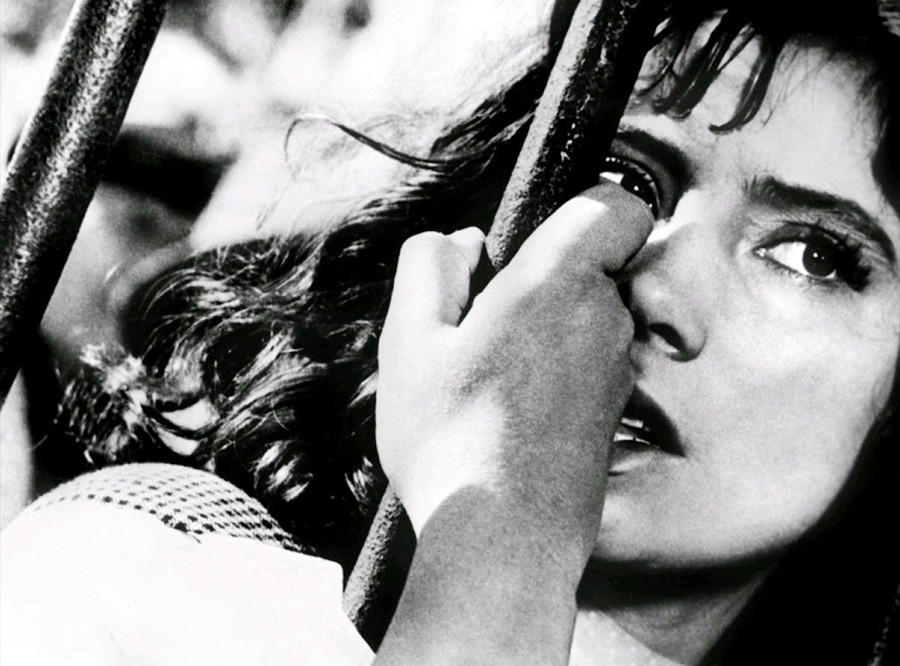
Tatiana Samoilova in 'The Cranes Are Flying'.
Mikhail Kalatozov/Mosfilm, 1957In 1958, the 23-year-old starlet won accolades at the world’s most prestigious film fair, the Cannes International Film Festival, for being the “most modest and charming actress”. Her portrayal of Veronika, a young woman whose life derails after her fiancé goes off to war, became her most recognizable role. ‘The Cranes Are Flying’ ranks among the world’s best war movies ever made. After the movie’s huge international success, Samoilova received a number of offers to work in Europe. However, Soviet authorities prevented her from accepting jobs abroad. Her next breakthrough role was in ‘Anna Karenina’ (1967), a movie adaptation of Leo Tolstoy’s epic novel.
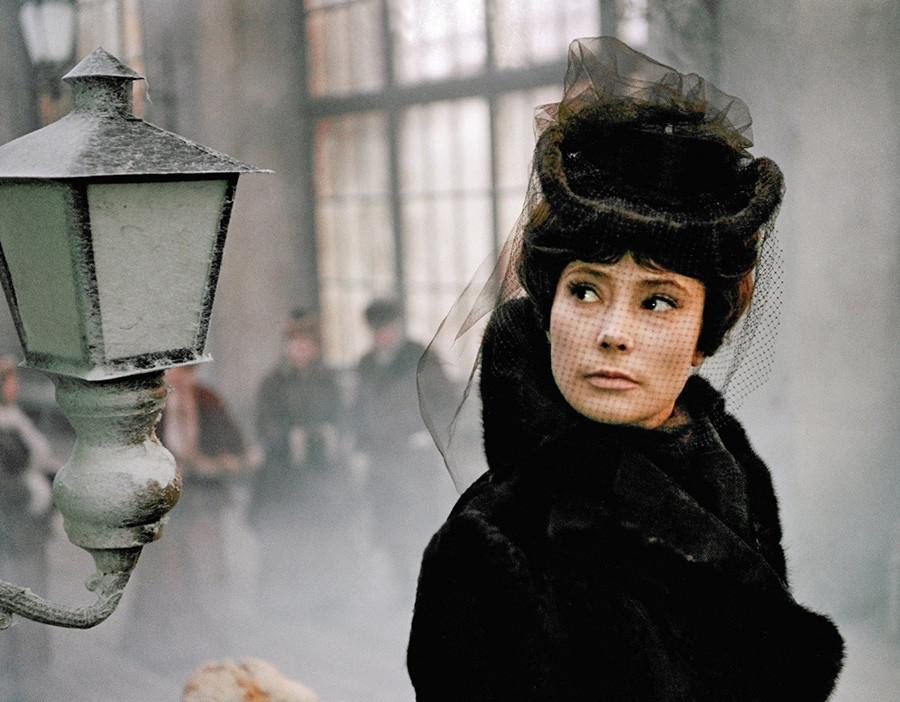
Tatiana Samoilova portraying Anna Karenina
Aleksandr Zarkhiv/Mosfilm, 1967While previous screen versions featured the likes of such movie goddesses as Greta Garbo and Vivien Leigh, Samoilova’s ‘Karenina’ (directed by Aleksandr Zarkhi) happened to tap into all the quintessential elements of Anna, but also without exaggeration and misstatement. Count Vronsky (Anna’s lover) was played by Samoilova’s first husband, Vasily Lanovoy.
In the years that followed, Samoilova regularly changed husbands, but scarcely appeared on screen. She made a pathetic comeback in the ‘Moscow Saga’ TV series in 2004 and then in a drama about drug addiction called ‘Nirvana’ (2008). It would be her last role.
Energetic. Theatrical. Charismatic. It’s impossible to pin down just one quality that makes Mordyukova one of Russia’s most legendary actors, renowned for her strong screen presence.
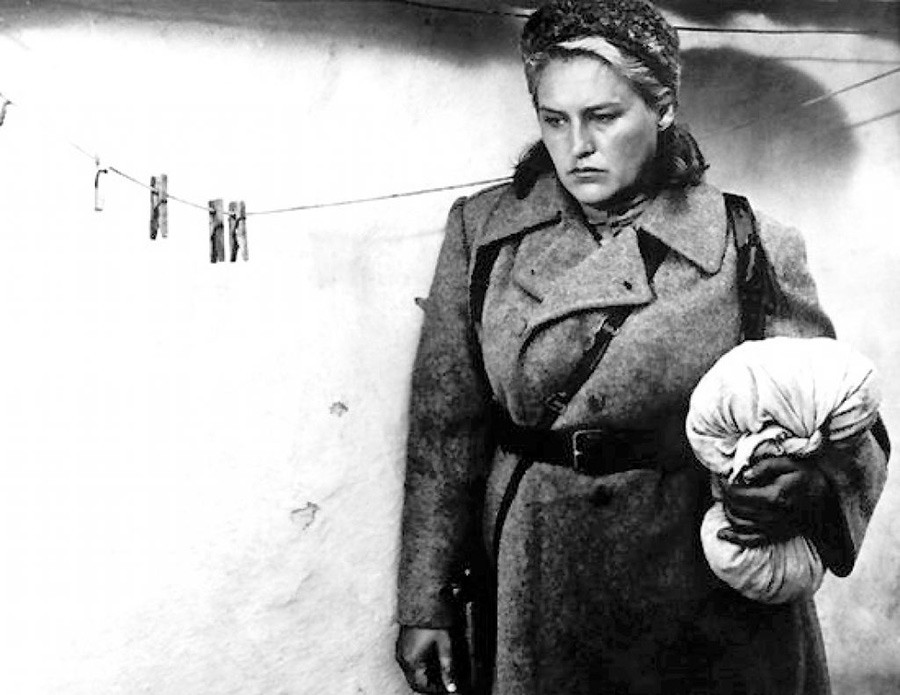
Nonna Mordyukova in 'The Commissar', based on Vasily Grossman's short novel.
Aleksandr Askoldov/Gorky Film Studio, 1967Mordyukova grew up on a collective farm in the Cossack village of Kostiantynivka, Ukrainian SSR. While her mother worked as chairwoman of the ‘kolkhoz’ (collective farm), Nonna soon realized her true calling was acting, not farming. She studied at the Russian State Institute of Cinematography (VGIK) and made her screen debut in ‘The Young Guard’. Mordyukova was the epitome of Soviet womanhood who could “stop a galloping horse and enter a burning house”. Her stand-out roles came in the movies ‘Other People’s Relatives’ and ‘The Commissar’.
Filmed in 1967, ‘The Commissar,’ based on Vasily Grossman's short novel, was shelved for two decades, because it touched on anti-Semitism, among other things. Mordyukova’s other significant movies included ‘A Simple Story’ (where Nonna could finally rely on her mother’s experience portraying a chairman of the collective farm) and the hit Soviet comedy ‘The Diamond Arm’.
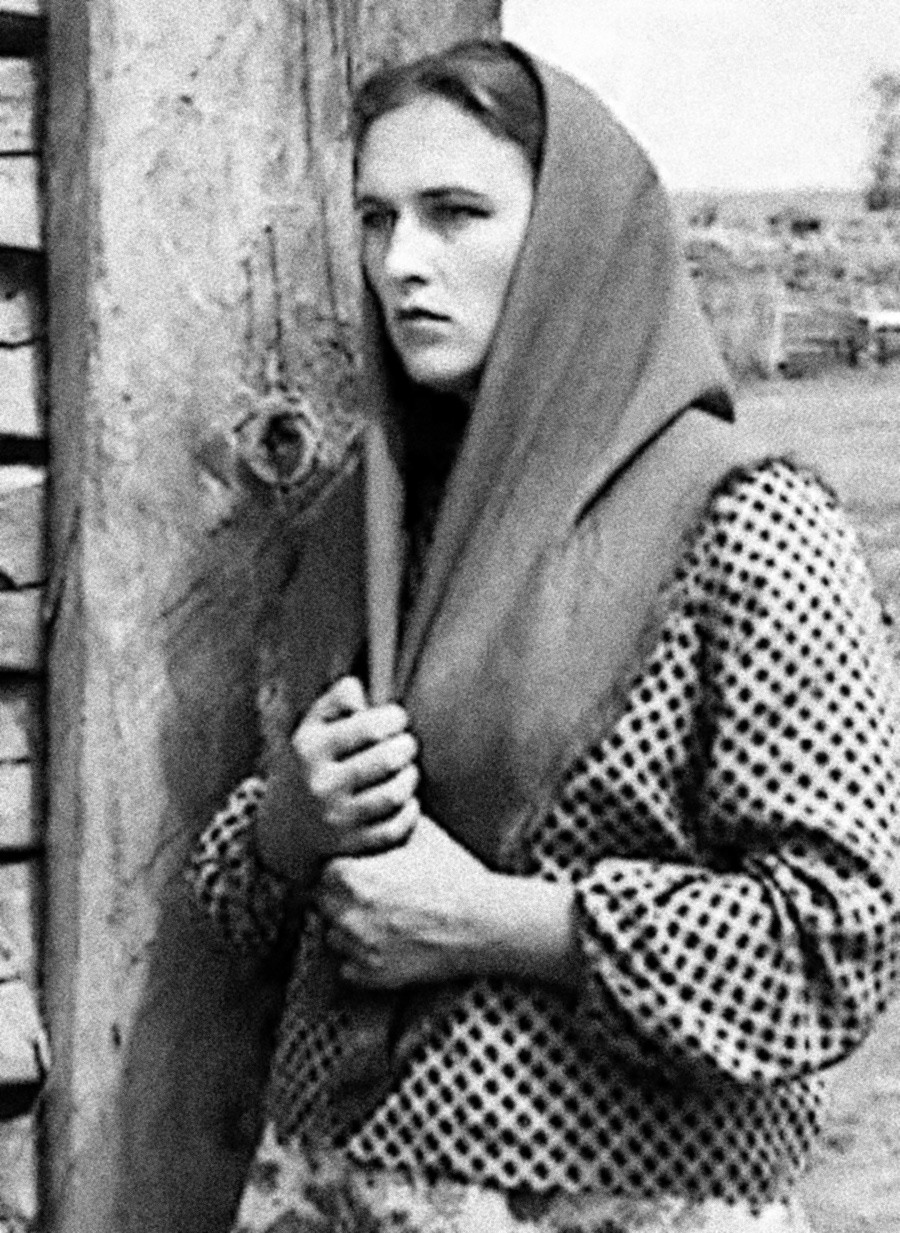
Nonna Mordyukova in ‘Other People’s Relatives’.
Mikhail Schweitzer/Lenfilm, 1955The vivacious actress then went on to star in ‘Family Relations’ (1982) directed by the legendary Nikita Mikhalkov. It became one of her most memorable roles. Mordyukova played an artless country woman who comes to Moscow to visit her only daughter and granddaughter. All she wants is to mend her daughter’s broken family unit. But the road to hell is paved with good intentions, so the woman’s interference only causes more friction.
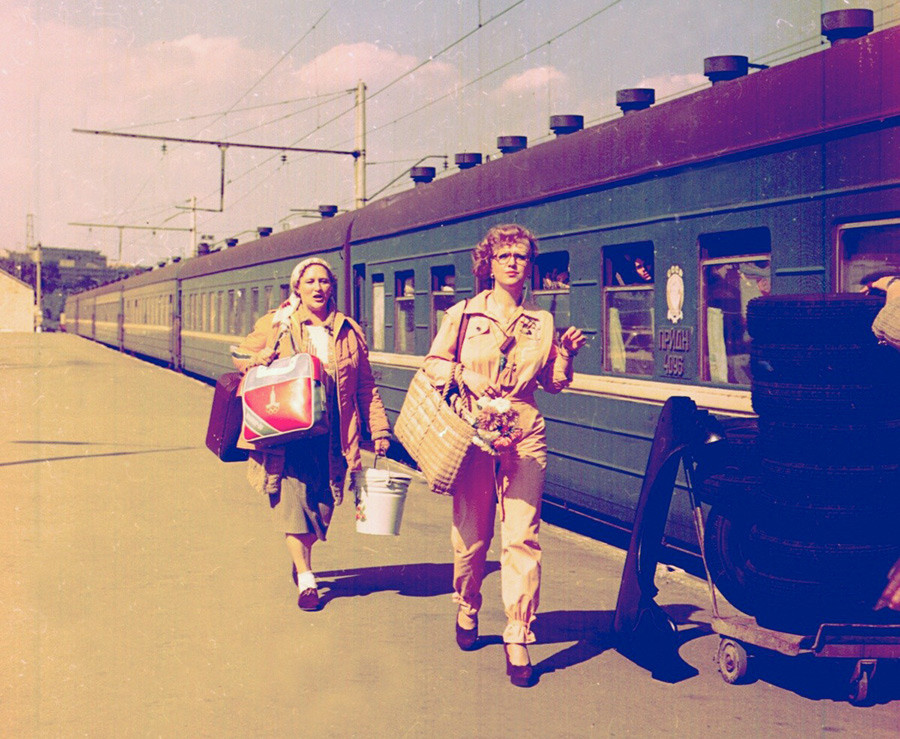
Nonna Mordyukova and Svetlana Kryuchkova in ‘Family Relations’.
Nikita Mikhalkov/Mosfilm, 1981In a career that spanned five decades and featured fifty movies, Mordyukova also published a memoir titled, ‘Don’t Cry, Cossack Woman’. She is listed among the top 10 most outstanding actresses of the 20th century by the British Film Encyclopedia.
Lyudmila found instant fame at 21 in the 1956 musical comedy ‘Carnival Night’ by Eldar Ryazanov.
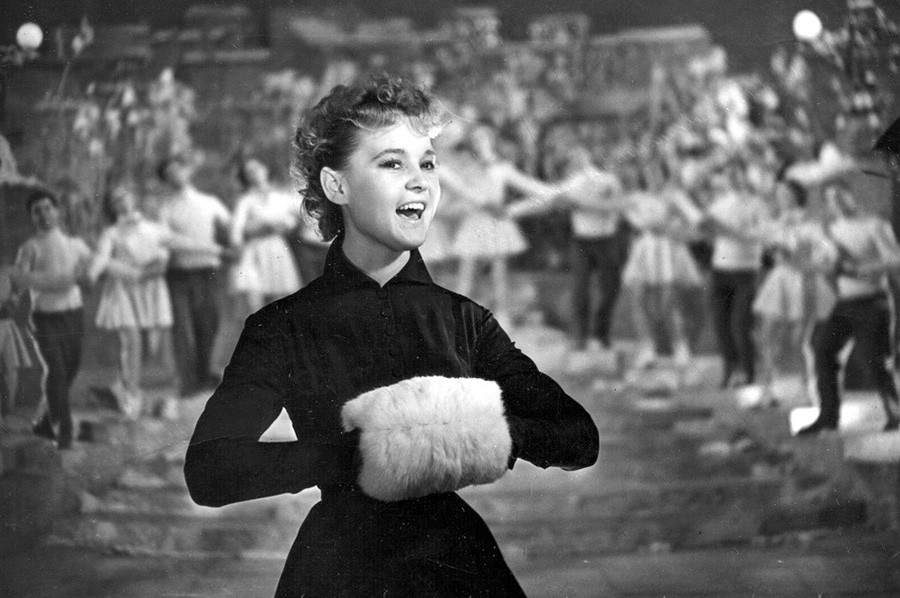
The star of 'Carnival Night', Lyudmila Gurchenko.
Eldar Ryazanov/Mosfilm, 1956Following the movie’s massive success Gurchenko, a multi-talented actress and singer, toured the Soviet Union with a show that featured popular songs from the movie. But the rising star had to wait several decades for the next pivotal role that would launch her career to the next level.
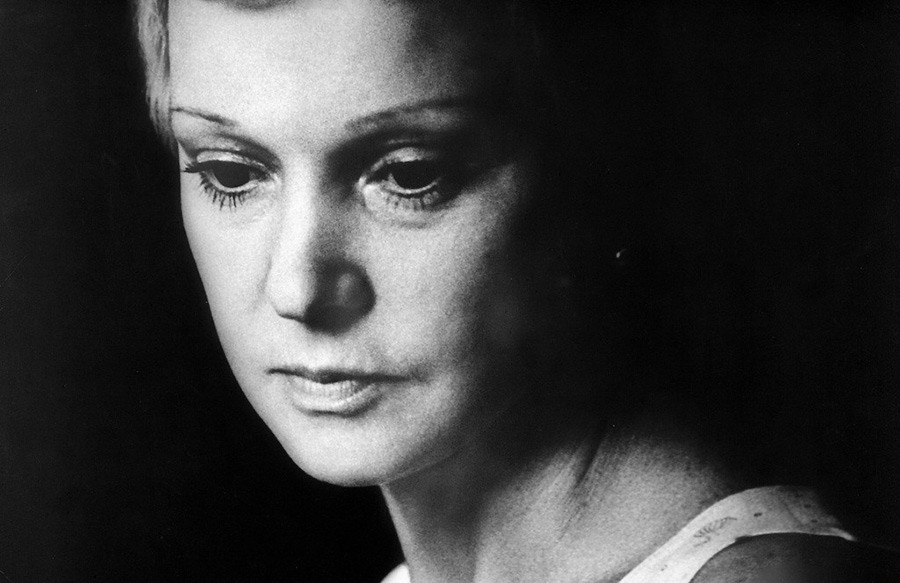
Lyudmila Gurchenko in ‘Twenty Days Without War’.
Aleksei German/Lenfilm, 1976Gurchenko delivered one of the most outstanding performances of her era in Aleksei German’s ‘Twenty Days Without War’ (1976). The drama hit all the right notes but was subsequently banned during Leonid Brezhnev’s rule, only to be released in 1981. Gurchenko worked with top-notch filmmakers, including Andrei Konchalovsky (she starred in his ‘Siberiade’) and Nikita Mikhalkov in ‘Five Evenings’ (a tragic story of a woman who receives a visit from a man she was once in love).
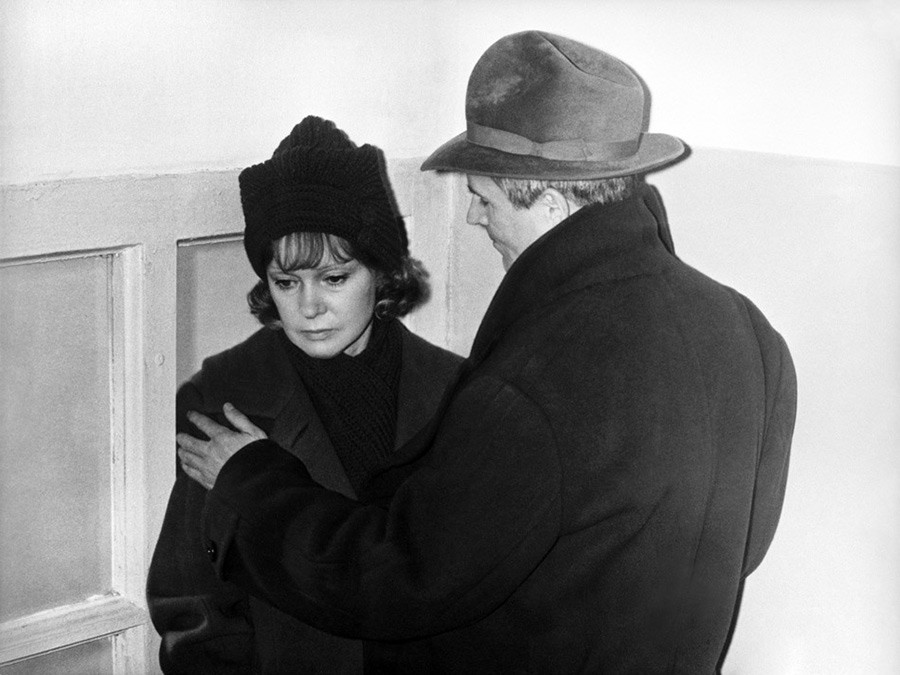
Lyudmila Gurchenko and Stanislav Lyubshin in ‘Five Evenings’.
Nikita Mikhalkov/Mosfilm, 1978However, it was Gurchenko’s role as the hapless waitress in ‘A Railway Station for Two’ (1983) that became one of her defining roles. An indefatigable woman of vigorous action, the actress continued to act on stage, appearing in movies, music concerts and television shows into her 70s.
Alisa is considered one of the greatest actresses of her generation. Her father, Bruno Freindlich, was a prominent actor of German descent, whose relatives had lived in Russia for over a century.
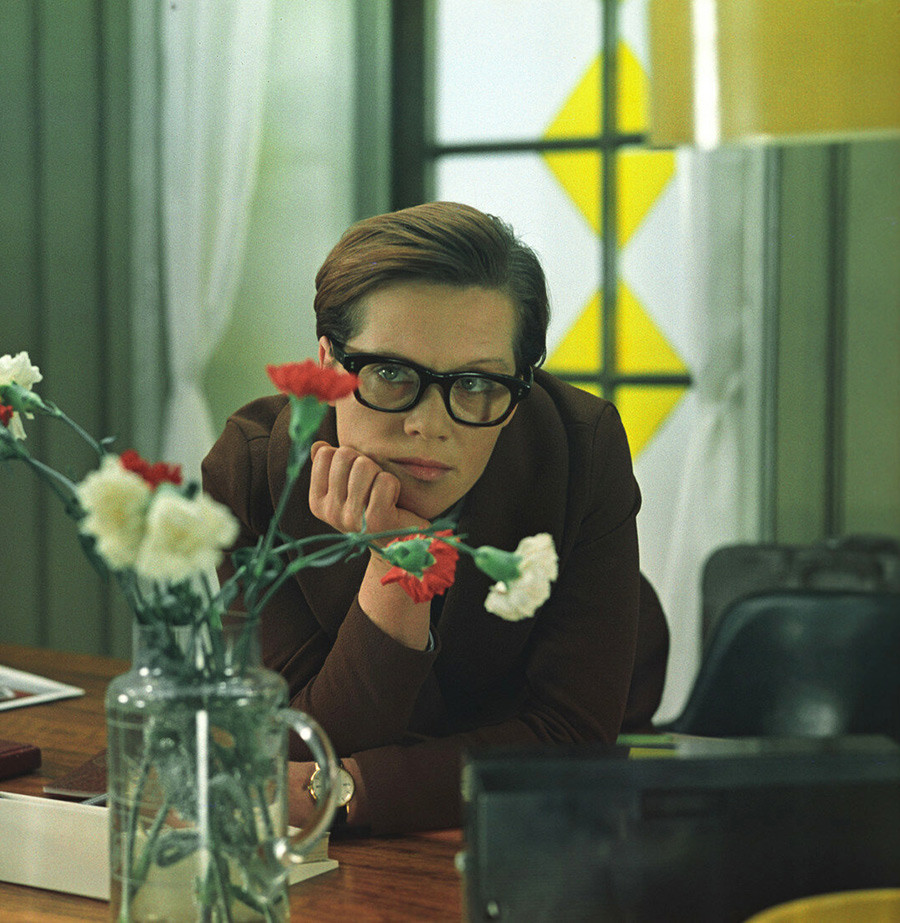
Freindlich as Ludmila Kalugina in hit Soviet comedy 'Office Romance'.
Eldar Ryazanov/Mosfilm, 1977The St. Petersburg-based actress boasts more than 40 movie credits to her name, lining up a string of career-defining performances in such timeless classics as ‘Unfinished Story’, ‘Talents and Admirers’, ‘The Twelve Chairs’. The longtime theater and film actress, Freindlich nailed it in ‘Office Romance’ by Eldar Ryazanov, whose movies now seem to come from a bygone era. The comedy was a huge box office success in the Soviet Union.
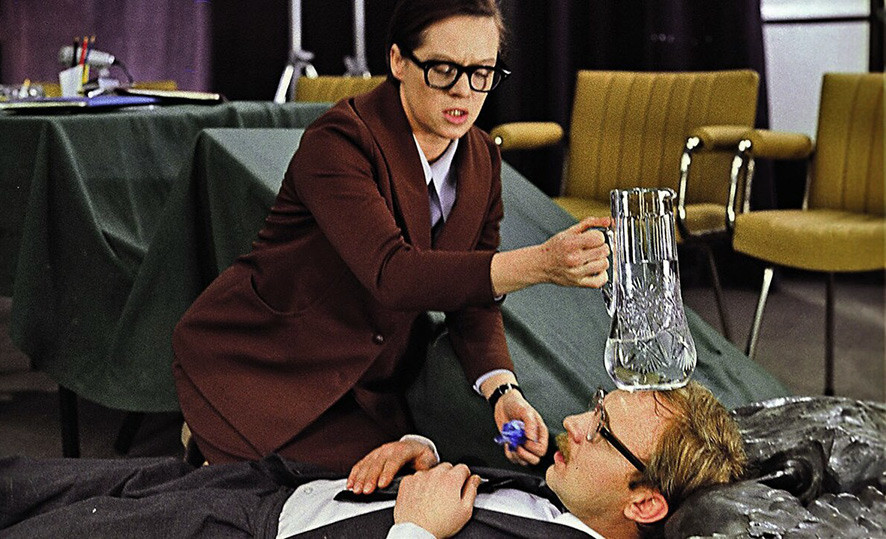
Alisa Freindlich and Andrei Myagkov in 'Office Romance'.
Eldar Ryazanov/Mosfilm, 1977Set in Moscow in the mid-1970s, it revolves around Anatoly Novoseltsev (a single quirky father of two sons) and his female boss, a single charmless woman named Ludmila Kalugina, who is nicknamed ‘frump’. Both work at a statistical bureau and silently despise one another before eventually going a long way from hate to love. Soviet movie aficionados have a soft spot for Freindlich’s performance in ‘Office Romance’, where the actress underwent a transformation from an ugly duckling to a pretty swan. She proved herself a world-class actress, delivering a towering performance in Andrey Tarkovsky’s sci-fi drama ‘Stalker’ (1979).
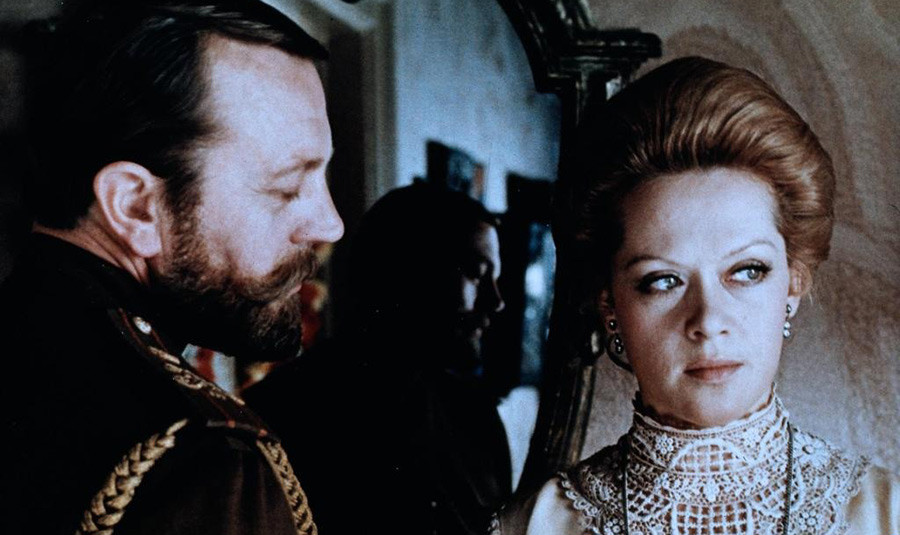
Alisa Freindlich and Atatoly Romashin in 'Agony'.
Elem Klimov/Mosfilm, 1974Her next remarkable part was in Elem Klimov’s period piece titled ‘Agony’, revolving around notorious Grigori Rasputin and the Romanov family. During a long career, which overcame six decades, the actress became known for playing characters who embody the transformation of the woman’s role. Freindlich also proved her talent countless times on stage at the Bolshoi Drama Theater in St. Petersburg.
READ MORE: 5 Soviet movies today’s feminists would like - and 5 they REALLY wouldn’t
Eternal beauty icon Terekhova created a stampede into theaters when her movies were showing. And yet, unlike many of her rivals, the actress was never quite comfortable with fame and glory.
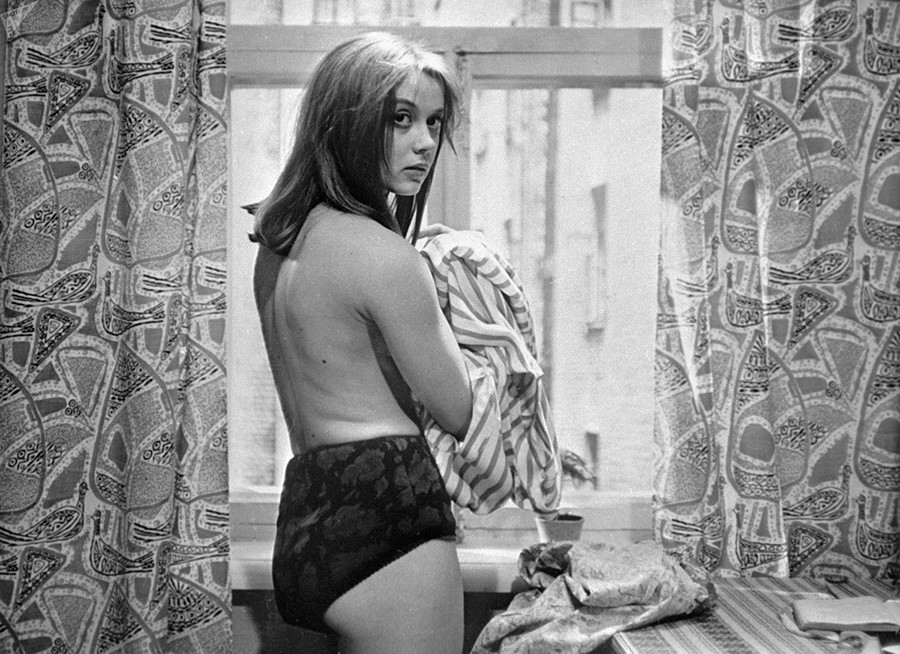
Margarita Terekhova in 'Hello, It's Me!'
Frunze Dovlatyan/Armenfilm, 1965She said she always felt less like a beauty and more like an actress. It’s hard to imagine that the beauty was a basketball captain in school and later studied physics and mathematics at the university in Tashkent, the former Soviet republic of Uzbekistan. Her life took a different direction after she moved to Moscow and enrolled to study acting at a theater school.
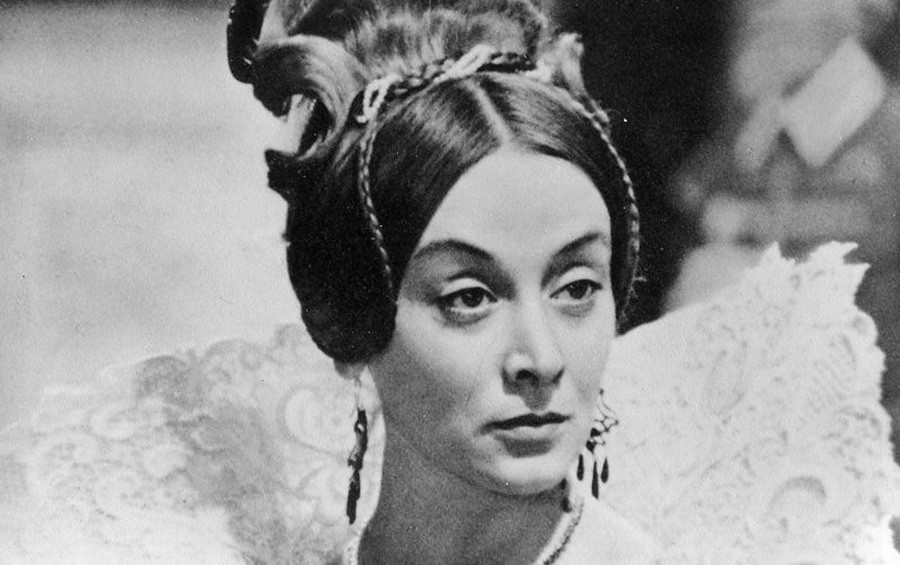
Terekhova starring in ‘The Dog in the Manger’.
Yan Frid/Lenfilm, 1977Terekhova achieved stardom in the late 1970s, after the release of the period TV comedy ‘The Dog in the Manger’ and the musical mini-series ‘D’Artagnan and Three Musketeers’.
Terekhova used an amalgam of emotional heft portraying the Countess Diana de Belflor and the Milady. But the world saw what the talented Soviet actress was truly capable of in ‘The Mirror’, Andrei Tarkovsky’s most personal and unconventional movie.
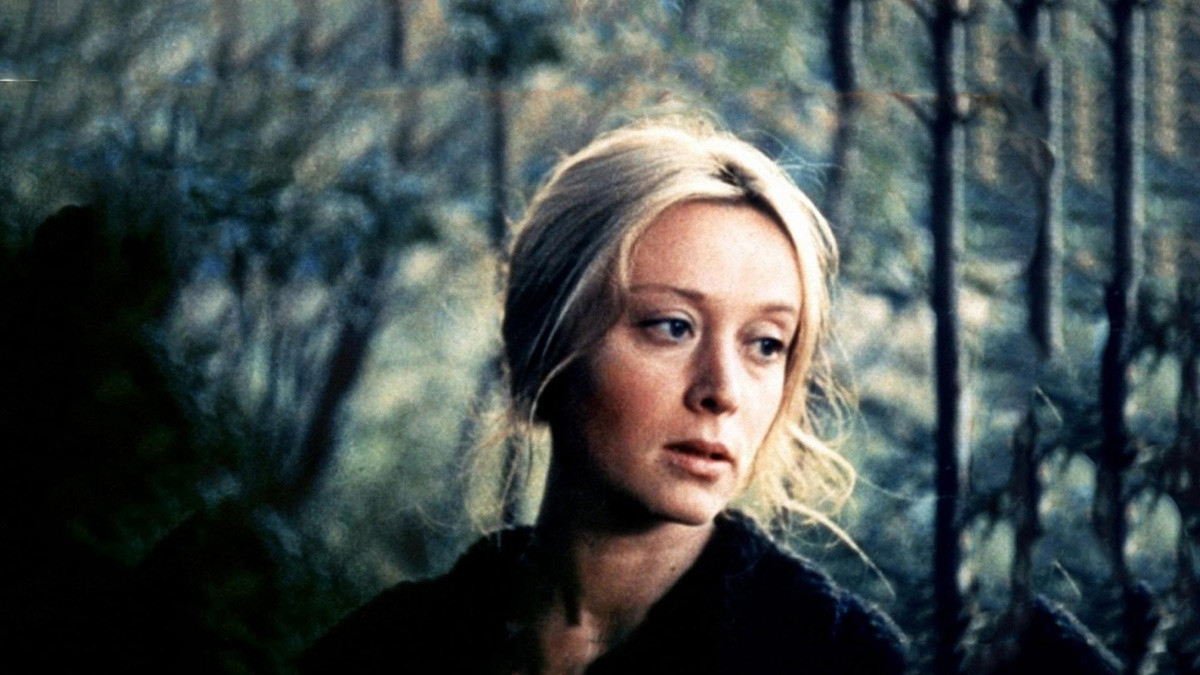
The star of 'The Mirror', Margarita Terekhova.
Andrei Tarkovsky/Mosfilm, 1974The genius director blended hypnotic scenes from three eras – his childhood in the countryside (with his mother portrayed by Terekhova), World War II, and the post-war period. Margarita had more iconic roles during her illustrious career and she proved to be one of the most accomplished Soviet actresses of all time.
Churikova is Russia’s answer to Meryl Streep. Her immense talent made her a beloved icon and she is larger than life in the film world. The prolific actress has excelled in movies for decades.
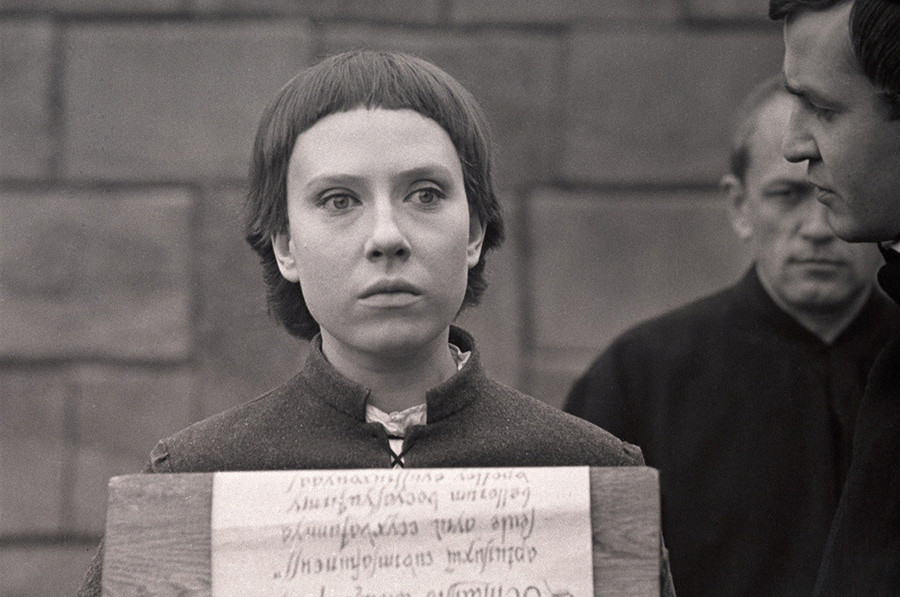
Inna Churikova in 'The Debut'.
Gleb Panfilov/Lenfilm, 1970Churikova’s wildly successful career in film has included lead roles in ‘No Path Through Fire’, ‘Wartime Romance’, and ‘The Very Same Munchhausen’ to name a few. Churikova brought unprecedented charisma and wisdom to ‘The Debut’, a Soviet romantic drama about the difficulties of love. In 1971, Soviet director Gleb Panfilov received the Silver Lion award for his movie at the Venice Film festival. Churikova meanwhile scooped the coveted Golden Lion for her multi-layered portrayal of Pasha Stroganova, a factory worker and an amateur actress who gets to play the role of Joan of Arc.
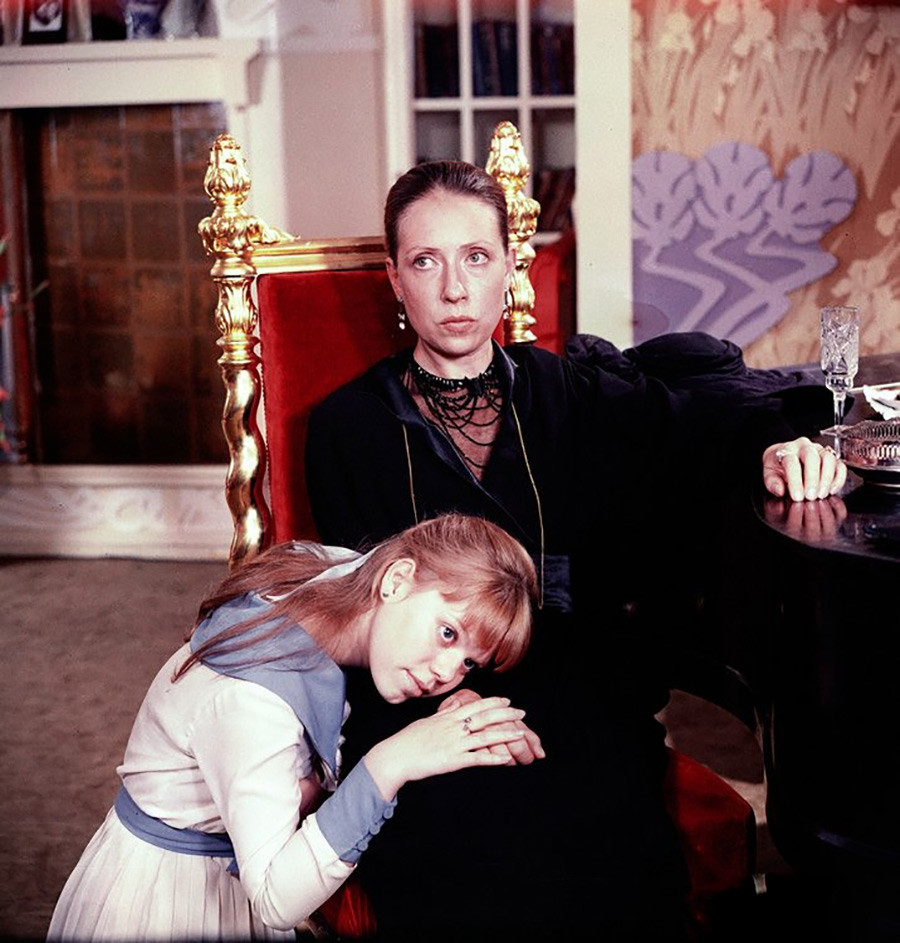
Inna Churikova in 'Vassa', based on Maxim Gorky’s classic play.
Gleb Panfilov/Mosfilm, 1983Churikova went on to become director Gleb Panfilov’s muse and wife. His next masterpiece, ‘The Theme’, also starring Churikova, was awarded a Golden Bear at the Berlin International Film Festival. The actress delivered an outstanding performance in ‘Vassa,’ directed by Panfilov and based on Maxim Gorky’s classic play. According to movie critics, it’s one of the boldest breakthroughs ever captured on film.
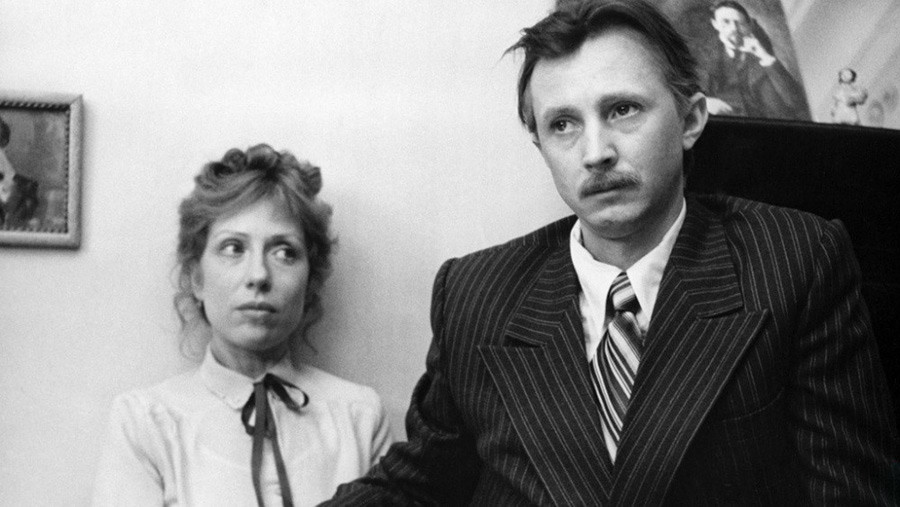
Inna Churikova and Nikolai Burlyaev in 'Wartime Romance'.
Pyotr Todorovsky/Odessa Film Studio, 1983Churikova’s part in ‘Wartime Romance’ brought her a Silver Bear for Best Actress in Berlin. It became another success story that affirmed her goddess-like status both in film and theater. She unleashed an emotional torrent playing a kind-hearted woman whose husband, a former Red Army soldier, falls in love with a former military nurse he had met during the war. When Vera finds out about the affair, instead of making a scene she invites her husband’s lover over for dinner where both cry for shame.
Vasilyeva burst onto the scene in the mid-1960s. Her father was a famous Soviet songwriter, who worked with outstanding composers of his time, including Isaak Dunayevsky and Vasily Solovyov-Sedoi. Her mother was the grand-niece of famous Soviet teacher and educator Anton Makarenko.
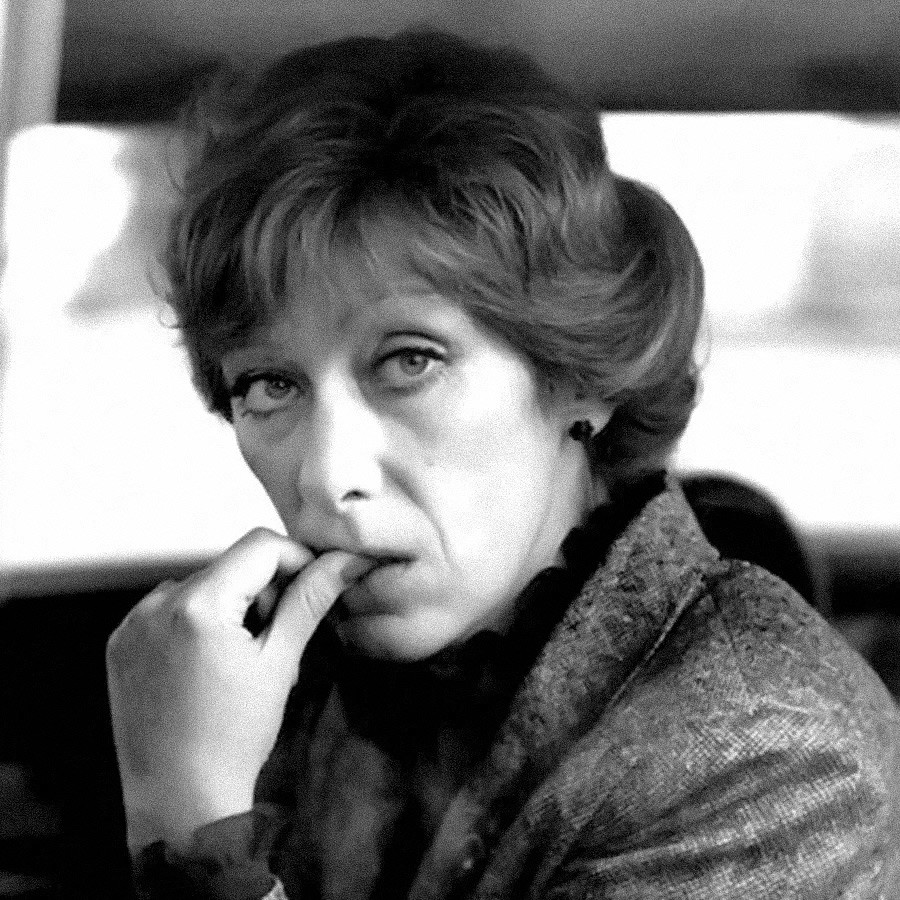
Yekaterina Vasilyeva burst onto the scene in the mid-1960s.
Archive photoYekaterina enrolled in a theater class when she was 13. She got lucky and was cast in her first professional role in 1965, when she still studied at VGIK (All-Russian State Institute of Cinematography). She had supporting roles in such movies as ‘They Call, Open the Door’ (1965) and ‘The Life and Ascension of Yuras Bratchik’, where she played a nun. Who would have guessed that a quarter of a century later, she would give up the stage to retire to a monastery. Back at the time, her performance in ‘The Soldier and The Queen’, based on Andrei Platonov’s fairy tale, was praised by movie buffs, revealing Vasilyeva’s talent as a fine actress who could convey a surprising spectrum of emotion, both on silver screen and on stage.
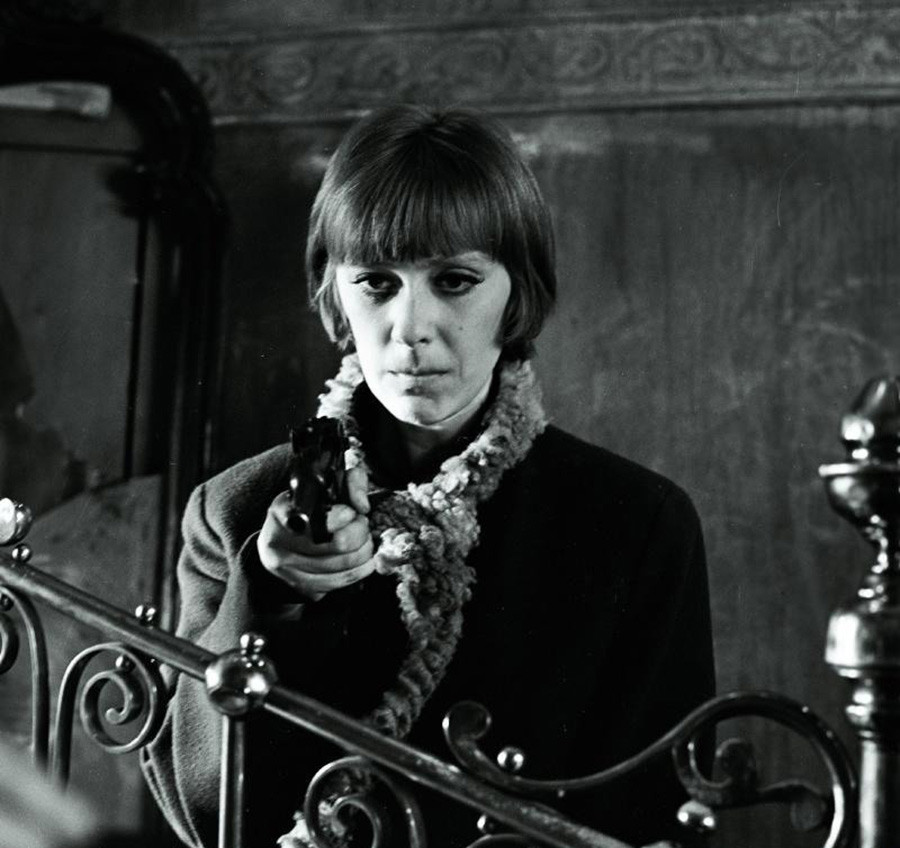
Vasilyeva in 'Diamonds for the Dictatorship of the Proletariat'.
Grigori Kromanov/Tallinnfilm, 1975She also starred in the 1971 Soviet musical comedy ‘Bumbarash’. Vasilieva had undeniable talent and charisma, embracing new roles with energy and enthusiasm. Vasilyeva left her mark during her 50-year career. Her extraordinary skill allowed her to play both comedic and dramatic roles with equal success. She managed to turn her seemingly ‘small’ roles into unforgettable characters in such classics as ‘Straw Hat’ (1974) and ‘An Ordinary Miracle’ (1978).
READ MORE: 8 Soviet films in which you can glimpse old Moscow
Alla has always carried herself with a regal air. Not because she’s snobbish, but quite possibly because she has an innate sense of grace and style. Demidova dreamed of becoming an actress since she was 5 years old. She studied acting and planned to enroll in film school, but failed her entrance exams.
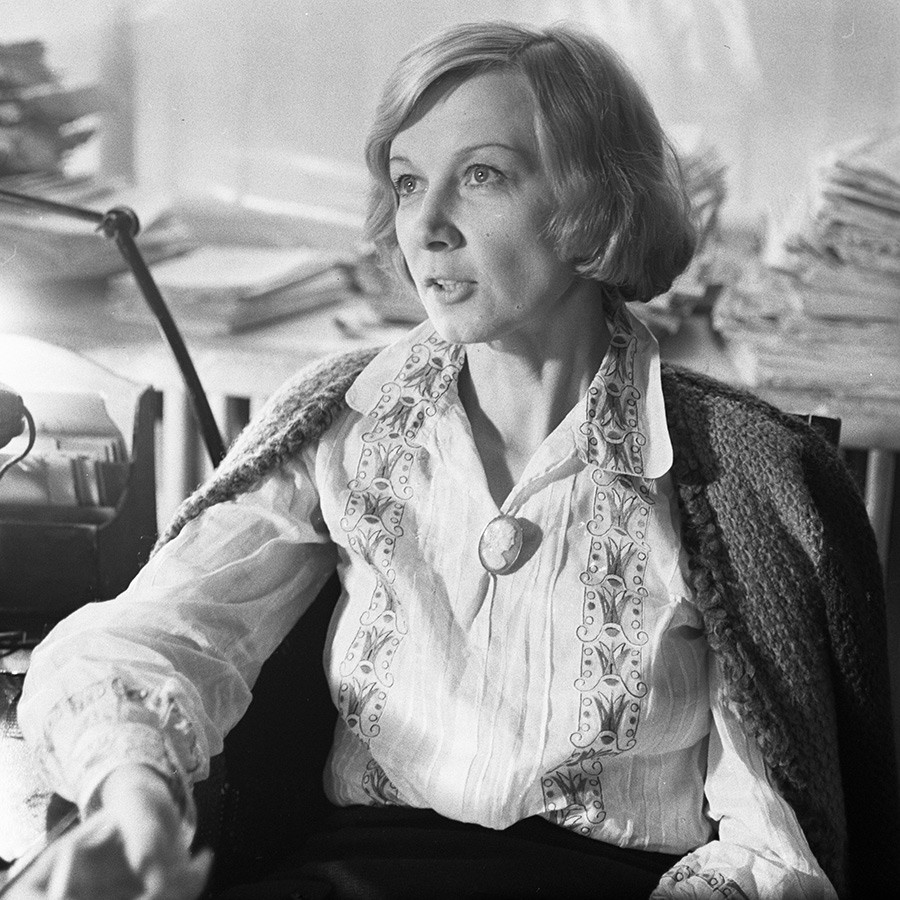
Alla Demidova in 'The Mirror' by Andrei Tarkovsky.
SputnikTo waste no time, the wannabe star graduated from Moscow State University instead, majoring in economics. Shortly after, she was busy conducting seminars on political economy for students in the philosophical department. Now, with a career spanning sixty years, it’s even hard to say whether Demidova is a better actress or narrator. She is extremely versatile. Alla first displayed the depth of her talent on stage. The head of the Taganka Theater, legendary Yuri Lyubimov, praised Demidova’s poise and admired her talent. She portrayed Gertruda in ‘Hamlet’ and Ranevskaya in ‘The Cherry Orchard’. Demidova instantly shot to cinematic fame after her performance in ‘Daytime stars’, a screen adaptation of an autobiographical story by Olga Bergholz. The drama depicted one of the most tragic and harrowing chapters of WWII, the siege of Leningrad. Following the movie’s release in 1968, Demidova was named a rising star by ‘The Soviet Screen’ magazine.
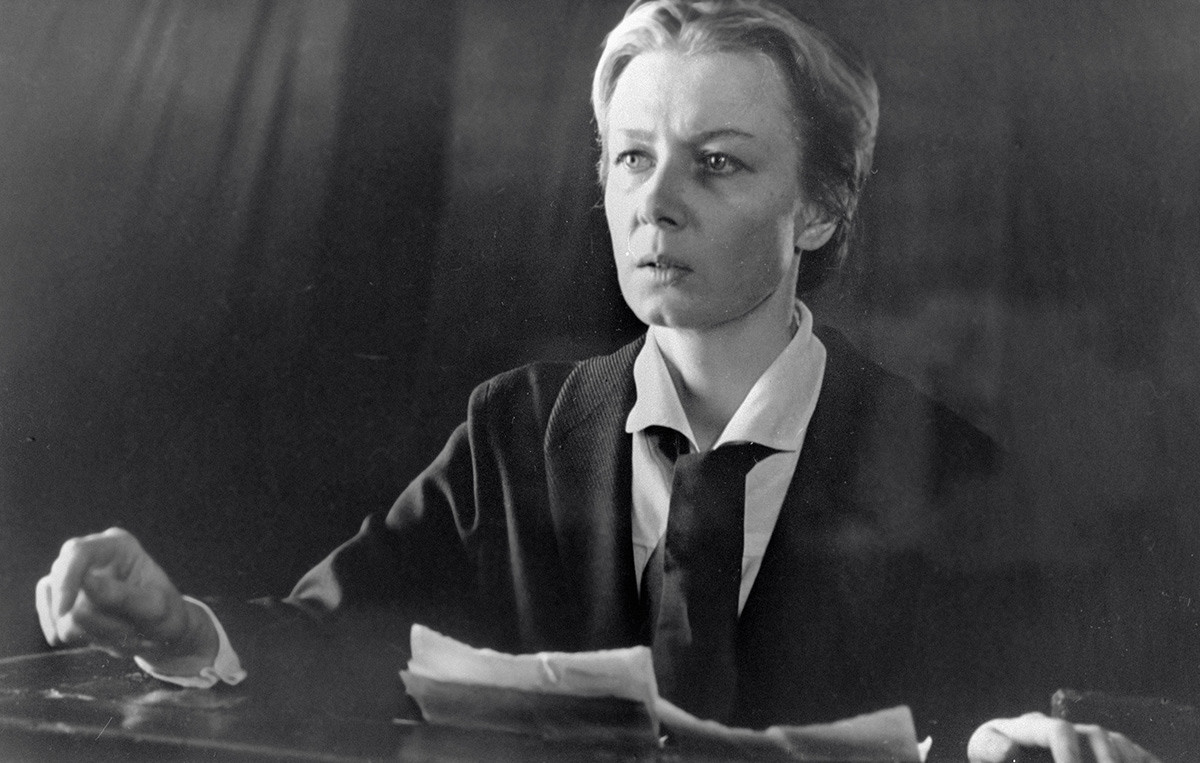
Alla Demidova in ‘The Sixth of July’.
SputnikDemidova was lauded for her commanding performance in the black-and-white drama ‘The Sixth of July’, based on the story of Maria Spiridonova, who helped create the Bolshevik Revolution. Demidova’s portrayal of Liza Protasova in ‘The Living Corpse’, based on Leo Tolstoy’s play, was nothing short of brilliant. Demidova has appeared in countless productions, scooped numerous awards, written several books, being rightly considered the grande dame of the movie and theater scene.
If using any of Russia Beyond's content, partly or in full, always provide an active hyperlink to the original material.
Subscribe
to our newsletter!
Get the week's best stories straight to your inbox